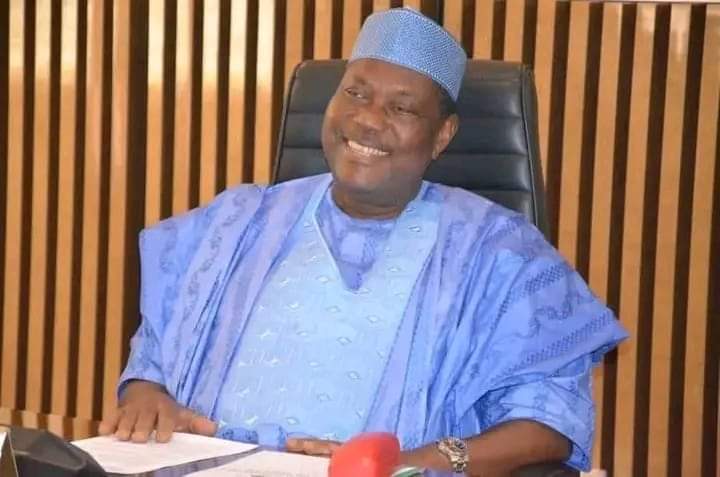Economy
Selective Outrage and the Presidency: Why SGF Akume Must Be Suspended Like Betty Edu

Leonard Karshima Shilgba
On April 6, 2024, in the early months of his administration, President Bola Ahmed Tinubu suspended then-Minister of Humanitarian Affairs, Dr. Betty Edu, over the approval of N585 million to be paid into a private account for grant disbursements. The President’s swift action was seen as a welcome signal of zero tolerance for fiscal misconduct.
However, a more recent and far weightier scandal involving N10 billion allegedly misappropriated by Terhile Uchi, a close aide of the Secretary to the Government of the Federation (SGF), Senator George Akume, now hangs like a dark cloud over that early promise.
The optics are bad; the silence is worse:
SaharaReporters revealed that Uchi, described as a long-serving personal aide of Senator Akume, was arrested in connection with the diversion of at least N10 billion in government funds. This sum exceeds the annual budgets of some Nigerian federal universities and is more than a month of federal allocation to an entire “small-size” state in Nigeria. That someone this close to the SGF could access such an amount raises urgent questions:
- Who is Terhile Uchi?
- What official capacity did he hold?
- How did he gain access to the funds?
- Was this within the constitutional responsibilities of the SGF’s office?
- Could he have had this access without Akume’s authorization or protection?
A Principal’s Responsibility:
Let us be clear: Aide misconduct at this scale should not be treated as an isolated anomaly. Political aides derive their legitimacy and access from the office of their principal. The SGF cannot detach himself from the conduct of a man he empowered.
In democracies that value integrity, such a scandal would have prompted an immediate resignation or at the very least, a suspension. Yet, Akume remains in the office of SGF in spite. Worse, tribal and political apologists have begun attacking those calling for his suspension—as if the ethical question is about ethnicity or partisanship.
There are several notable instances globally where senior political office holders resigned (or were forced to resign) due to the malfeasance or criminal activities of close aides, associates, or appointees, even when they were not directly implicated. These examples demonstrate the principle of ministerial responsibility or the “buck stops here” ethos in action. By the way, public officials are responsible for whom they choose as aides, and must not claim to be unaffected by their criminal actions while serving them in public office:
1. Shinzo Abe (Japan, 2007):
- Position: Prime Minister of Japan
- Reason for resignation: Although not directly implicated, Abe resigned amid scandals involving misuse of public funds by cabinet ministers and the suicide of his agriculture minister under investigation. The public perceived the scandals as reflective of Abe’s poor leadership and failure to maintain ethical governance.
- Lesson: High standards of accountability in Japanese politics forced the top leader to take responsibility for his subordinates’ misconduct.
2. Peter Mandelson (UK, 1998 & 2001):
- Position: Secretary of State (UK)
- Reason for resignation (1998): Resigned over a secret loan he received from a fellow minister’s aide, which created a conflict of interest—even though it was not illegal.
- Reason for resignation (2001): Resigned again after accusations of improper intervention on behalf of a wealthy businessman.
- Lesson: The UK political culture values perception and integrity highly, prompting resignation even when misconduct was by associates or merely suspected.
3. Alberto Fujimori (Peru, 2000):
- Position: President of Peru
- Reason for resignation: His resignation came amid a massive corruption scandal involving his close aide and intelligence chief, Vladimiro Montesinos, who was caught on video bribing officials. Fujimori fled the country and resigned by fax.
- Lesson: Aide misconduct led to the total collapse of public trust and the administration. 4. Richard Nixon (USA, 1974):
- Position: President of the United States
- Reason for resignation: Resigned due to the Watergate scandal, which started as a break-in organized by campaign aides. The cover-up and involvement of close staff (not Nixon’s personal act of burglary) brought him down.
- Lesson: Even if not directly responsible, the use of aides for illegal political ends resulted in forced resignation. 5. Francois Fillon (France, 2017 Presidential Candidate, Former PM):
- Position: Former Prime Minister and Presidential candidate
- Reason for resignation: His campaign collapsed after revelations that his wife and children were paid large sums as parliamentary assistants without doing actual work.
- Lesson: Public perception of using close aides or family to siphon funds caused political ruin, even without court conviction at the time. 6. Seiji Maehara (Japan, 2011):
- Position: Foreign Minister
- Reason for resignation: Resigned after it was revealed that a foreign national had donated a small sum to his campaign fund, violating Japan’s campaign finance law. The donor was a friend, not an official, but Maehara resigned to preserve public trust.
- Lesson: Even minor violations by associates prompted resignation in line with public accountability.
Contrast with Nigeria:
In Nigeria, however, the principle of resignation due to aide malfeasance is rarely upheld. Most public officials remain in office unless removed by force of public outcry or presidential will. This is what makes the inaction on SGF Akume’s case even more alarming when contrasted with President Tinubu’s decisive suspension of Betty Edu, setting Nigeria on an admirable path of public accountability and transparency.
Compare with Betty Edu.
President Tinubu didn’t flinch when questions arose about Edu’s modest N585 million approval. Yet, he is silent in the face of an alleged ₦10 billion theft involving an aide who operated inside the SGF’s inner circle. Could President Tinubu’s silence be strategic to hit at the right time of his strategic choosing? Maybe only he knows, but the optics remain bad.
Are we now to believe that political weight determines accountability? Is Akume too valuable to be suspended? Is selective outrage now the standard for justice? President Tinubu holds the answers.
The Stakes for Justice:
The SGF coordinates federal ministries and oversees dozens of agencies. His continued stay in office risks intimidating or obstructing EFCC investigators. Nigerians must ask: Can the EFCC credibly “follow the money” if the man whose office gave Uchi access to billions is still at the helm?
We must not forget: Justice is not only about outcome; it is also about process and public confidence.
President Tinubu’s Test:
As your administration approaches its midterm, Mr. President, the choices you make now will define your legacy. Nigerians, including Betty Edu, are watching to see if you will demonstrate fairness or fold under political considerations.
Suspend SGF Akume to enable full, credible investigations. That is what you did with Edu. Anything less will confirm suspicions of selective integrity and political hypocrisy. And as your supporter, my hunch is that you will not sacrifice equity.
Let justice not wear tribal robes. Let it be blind, as it should be. For Nigeria’s sake. May President Tinubu’s government prosper for the benefit of all Nigerians. Happy second anniversary in advance, Mr. President!
Sources:
- SaharaReporters, “SGF Akume’s Aide Arrested For Allegedly Misappropriating ₦10 Billion,” April 2025.
- Premium Times, “Tinubu Suspends Minister Betta Edu Over N585m Grant Controversy,” January 8, 2024.
- BudgIT Nigeria, “State Allocations and University Budgets: Federal Data 2022-2024.”
- The Guardian, “The Office of the SGF: Roles and Influence in Nigeria’s Executive Governance,” July 2022.
Economy
JUST IN: FG Halts Planned 15% Import Duty on Petrol, Diesel

By: Fabian Apechihin
The Federal Government has suspended the planned implementation of a 15 percent import duty on petrol and diesel.
This was disclosed on Thursday by George Ene-Ita, Director of Public Affairs at the Nigerian Midstream and Downstream Petroleum Regulatory Authority (NMDPRA), who urged Nigerians to avoid panic buying.
President Bola Tinubu had earlier, on October 29, approved the imposition of the tariff following a proposal by the Executive Chairman of the Federal Inland Revenue Service (FIRS), Zacch Adedeji. The approval, conveyed in a letter signed by the President’s Private Secretary, Damilotun Aderemi, was intended to take effect from November 21, 2025.
The proposed policy sought to impose a 15 percent duty on the cost, insurance, and freight (CIF) value of imported petrol and diesel. It was aimed at supporting domestic refineries — such as the Dangote Refinery and modular plants — by making imported fuel less competitive. However, experts cautioned that the move could lead to an increase of up to ₦150 per litre in pump prices and further fuel inflation and transportation costs.
In its latest update, the NMDPRA confirmed that the import duty is no longer under consideration.
“It should also be noted that the implementation of the 15% ad-valorem import duty on imported Premium Motor Spirit (PMS) and Automotive Gas Oil (Diesel) is no longer in view,” the Authority stated.
The agency further assured the public of adequate fuel availability across the country, noting that national stock levels remain within the required sufficiency threshold.
“There is a robust domestic supply of petroleum products — including PMS, AGO, and LPG — from both local refineries and imports, ensuring timely replenishment of depots and retail stations,” the statement added.
NMDPRA cautioned marketers against hoarding, panic buying, or arbitrary price increases, emphasizing that it will continue to monitor the market to prevent any disruption in supply.
“While appreciating the efforts of stakeholders in maintaining smooth and uninterrupted supply, the public is assured of NMDPRA’s commitment to safeguarding national energy security,” the statement concluded.
Economy
FGN, Sign $400m Deal To Boost Local Steel Production

From Hassan Taiye
The Federal Government of Nigeria, FGN, through the Ministry of Steel Development, has signed a Joint Strategic Cooperation Declaration with Stellar Steel Company Limited.
Stellar Steel Company Limited is a steel-manufacturing enterprise established to operate in Nigeria, with major investment backing from Chinese parent groups: Galaxy Group and RSIN Group based in Fuzhou, Fujian Province, China.
The company has committed approximately US$450 million for a steel plant project in Ogun State, Nigeria, scheduled to begin operations by mid-2026.
This landmark partnership is aimed at revitalising Nigeria’s steel industry and reducing the nation’s dependence on imported steel products, according to a statement signed by the the Principal Information Officer, PIO, Ijomah Opia, for the director, Information and Public Relations in the ministry.
The agreement, signed in Abuja, on Tuesday 28th October, 2025 will see Stellar Steel invest $400 million in the construction of a modern Steel Plant in Ewekoro, Ogun State. The project will be developed in three phases, with the first phase expected to begin production by 2026.
The Minister of Steel Development Prince Shuaibu Abubakar Audu signed the agreement when he hosted Mr Li, President of Inner Galaxy Group and other members of the Stellar Steel Company Limited in the Ministry’s Headquarters in Abuja.
According to Prince Audu, the collaboration aligns with the federal government’s goal of achieving 10 million tonnes of crude steel production per annum by 2030, a major step toward industrial self-reliance and economic diversification.
The minister further stated that the Federal Ministry of Steel Development would facilitate policy and infrastructure support, including inclusion of Stellar Steel’s logistics projects in the National Infrastructure Plan and access to available fiscal incentives.
Highlights of the cooperation includes the followings:
1.Development of a localised iron ore supply chain to reduce import dependence and save over $1 billion in foreign exchange annually.
- Creation of more than 2,000 direct and 20,000 indirect jobs across the steel value chain.
- Promotion of green steel production using clean and energy-efficient technologies.
- Strengthening of Nigeria’s position as a regional steel manufacturing hub in West Africa.
Audi also said that in return, Stellar Steel would prioritise local recruitment and training, partnering with Nigerian universities to build technical and managerial expertise in steel production.
Prince Shuaibu emphasised that this strategic cooperation marks a new era for Nigeria’s steel industry and demonstrates the government’s commitment to sustainable industrial growth and economic transformation.
In his remarks the leader of the delegation, Mr Li assured the minister that Stellar Steel would respect all agreements reached and would ensure the completion of the project in record time and assured that all safety standards will be observed.
Mr Li was accompanied during the visit by Mr You Xiastian, Vice Chairman of RSIN Group, Mr Jackie Den, Vice President of Inner Galaxy Group and Mr Yin, Director of RSIN Group.
He recalled that the Minister of Steel Development, Prince Audu, performed the groundbreaking ceremony of the Steel Plant in Ogun State sometime in April, 2025.
Speaking at the signing, representatives of both parties emphasised that the partnership would strengthen Nigeria’s industrial base, create jobs, and foster technology transfer in the sector.
Economy
EU Delegation Strengthens Ties with Nigerian Senate

From Hassan Taiye
A high-level delegation from the European Union (EU) Parliament’s Foreign Affairs Committee, led by Mr. David McAllister, paid a courtesy visit to the Nigerian Senate today October 28, 2025.

“We are here to deepen our understanding of the situation in West Africa and strengthen our partnership with Nigeria,” McAllister said.
Senate President Godswill Akpabio welcomed the delegation, emphasizing Nigeria’s strategic partnership with the EU. “Nigeria is committed to strengthening ties with the EU, highlighting areas of mutual interest, including security, trade, and governance,” Akpabio said.
The delegation, comprising Ambassador Greta Mylott, EU Ambassador to Nigeria and ECOWAS, Miss Zelaya Zorko, Miss Mata Tamido, Sebastian Tankman, General Christophe Gomart, and Sebastian Buharo, is undertaking a comprehensive tour of West Africa, with stops in Nigeria and Ghana.
During the visit, Akpabio shed light on the challenges facing female representation in Nigeria’s parliament. “Women often vote for male candidates, making it difficult for female candidates to win elections,” he noted.
“The Senate is exploring innovative solutions, including constitutional amendments, to boost female participation in the legislative process, with support from organizations like the Black Women’s Forum.”
The EU delegation’s visit aims to foster greater understanding and cooperation between the EU and Nigeria, addressing shared concerns, such as terrorism, climate change, and economic development.
“The EU is committed to supporting Nigeria’s development efforts,” McAllister assured the Senate, emphasizing the bloc’s interest in seeing a stable, prosperous, and democratic Nigeria.
Their visit also includes participation in the forthcoming International Islamic Conference on Security and Governance in West Africa and the Sahel, scheduled for November 4-6, 2025 at ECOWAS Commission.
Akpabio expressed optimism about the potential for enhanced cooperation, highlighting Nigeria’s readiness to work with the EU to address common challenges.
-

 Uncategorized5 years ago
Uncategorized5 years agoFG, states urged to harness flooding for ranching, others with technology – Agbaje
-

 Headlines10 years ago
Headlines10 years agoBreaking: EFCC seals Borno House of Assembly, as Hon members take to their heels
-

 News11 years ago
News11 years agoNigeria Security Operatives Stage Manhunt For Homosexual Perpetrator
-

 News9 years ago
News9 years agoHow 21-year-old Girl fled community over accusation of lesbianism
-

 News10 years ago
News10 years agoYobe Gov Moves Against Deputy
-

 Opinion7 years ago
Opinion7 years ago7 signs she has friend zoned you
-
Technology4 years ago
Online job placement company headhunts women
-

 Headlines10 years ago
Headlines10 years agoBorno Dep Gov Abducts Another Church Leader





